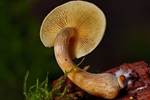Okom wrks labs works with Autodesk for mycelium-based composite commercialization
Research Residency program will further refine material properties and manufacturing processes to support the startup’s efforts of providing high-performance, regenerative biocomposite solutions.
Source | okom wrks labs
(Chicago, Ill., U.S.), an industrial design company, announces that it will begin an Autodesk Research Residency at the Autodesk Tech Center in Boston. This residency underscores the company’s commitment to advancing the potential commercialization of mycelium-based composites.
This class of materials “typically incorporate an agricultural residue like hemp hurd as a dispersion phase and fungal mycelium as the matrix phase,” says Joshua English, founder and CEO. “Our innovation includes a textile reinforcement phase that dramatically improves the strength and stiffness of mycelium-based composites.” Okom wrks labs says that its sustainable materials feature an R-value of 2.4 (improving insulation properties for energy-efficient construction) and a compressive strength of 1 MPa (for durability and strength) — this reportedly makes them 1.1 orders of magnitude stronger and 3.9 orders of magnitude stiffer than other mycelium-based products on the market, thus widening their application range.
“We are excited to begin our Autodesk Research Residency,” says English. “This opportunity will be a big boost for our research and development efforts, leveraging Autodesk’s state-of-the-art tools to push the boundaries of what’s possible with mycelium-based composites. We want to deliver materials that are not only environmentally sustainable but also meet the highest standards of performance and reliability. Our goal for the residency is to develop an automated fabrication process that can provide consistency across a broad range of building material system applications.”
from on Vimeo.
During the residency, okom wrks labs will collaborate with Autodesk’s network of experts and use advanced technologies to further refine the material properties of its mycelium-based composites. The residency will focus on optimizing the manufacturing process to enable the deployment of mycelium-based materials for a broader range of industrial applications,
including construction, product design and environmental engineering, where sustainability and high performance are paramount.
Related Content
-
McLaren develops aerospace-inspired ART method for volume composite super car engineering
Automated rapid tape (ART) technique, already deployed at the MCTC and to be used for future McLaren models, is capable of producing lighter, stiffer and stronger carbon fiber structures with less waste.
-
TPI manufactures all-composite Kenworth SuperTruck 2 cab
Class 8 diesel truck, now with a 20% lighter cab, achieves 136% freight efficiency improvement.
-
Rocket Lab begins installation of large AFP machine for rocket production
The 99-ton AFP machine, custom-designed and built by Electroimpact, is claimed to be the largest of its kind, expecting to save around 150,000 manufacturing hours in the Neutron rocket’s production process.



